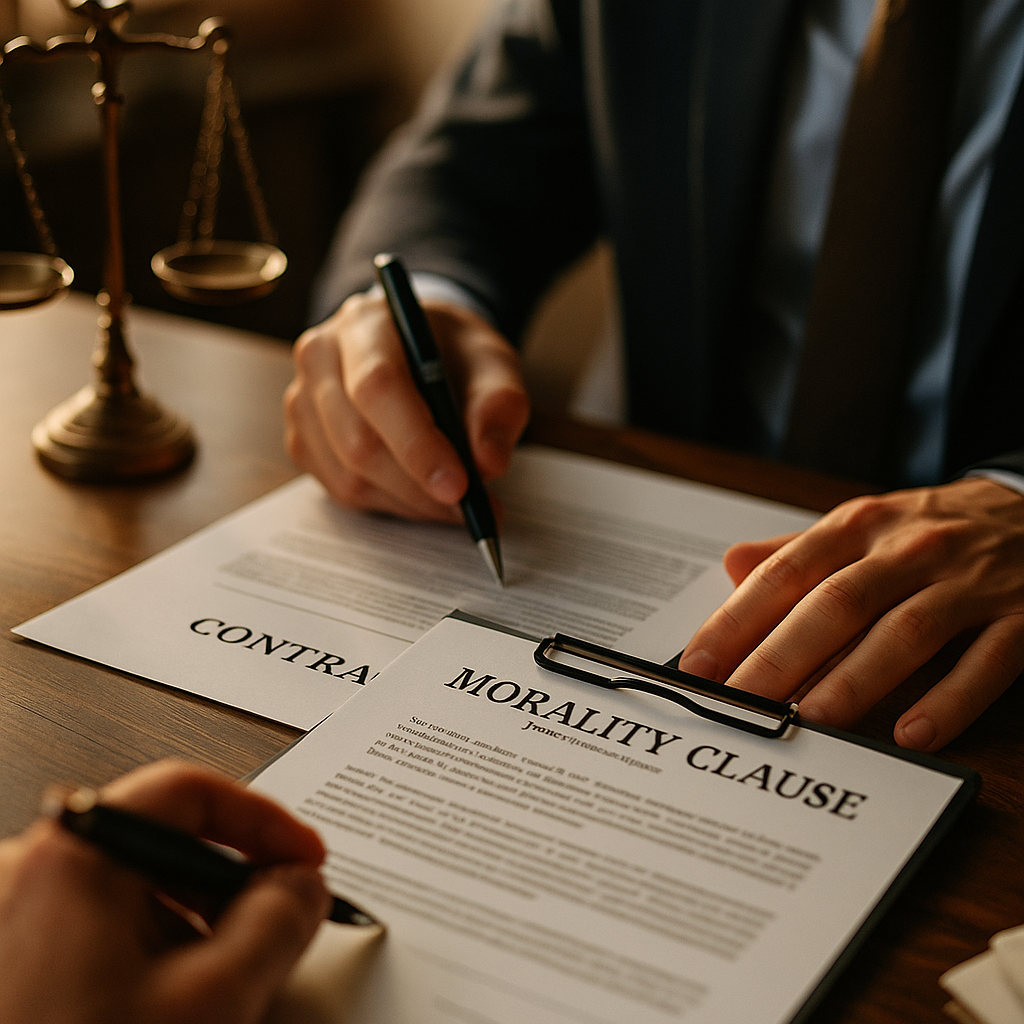A “Morality Clause” invocation can make or break major contracts across industries, from entertainment to tech. This case study explores the legal teardown process, revealing both the pitfalls and legal strategies surrounding morality clauses. Discover how contract lawyers and business leaders can navigate these contentious provisions for maximum protection and fairness.
The Anatomy of a Modern Morality Clause: Legal Definition and Purpose
Morality clause legal definition is crucial for interpreting and enforcing these often-contentious provisions. In 2025, morality clauses have become even more nuanced, addressing behaviors—from public scandals to social media missteps—that could harm a company’s reputation. Typically, these clauses allow employers or partners to terminate a contract if a party engages in conduct deemed unethical or damaging. Their primary purpose is to protect brands, maintain public trust, and provide a clear recourse when personal conduct threatens business interests. In litigation, definitions of morality are dissected, with courts examining language specificity and intent. Given evolving social norms and high-profile incidents, the legal scope of “morality” has expanded, making precise wording and context critical for enforceability.
Morality Clause Enforcement in Practice: High-Profile Legal Cases
Morality clause enforcement has sparked media headlines and legal debate in recent years. Notably, in a 2024 entertainment industry dispute, a streaming platform invoked a morality clause after a lead actor’s off-screen comments caused significant subscriber churn. The clause’s ambiguous “acts bringing disrepute” wording became central to the legal battle. Courts considered whether the behavior involved criminality or merely changed public sentiment. Legal experts caution that enforcement hinges on:
- Clarity of prohibited conduct
- Objective standards versus subjective interpretation
- Evidence of reputational harm or financial loss
- Fair notice to the party involved
Case studies demonstrate that overly broad or vague clauses face challenges, while tailored provisions aligned with business goals are more robust under judicial scrutiny.
Navigating Morality Clause Disputes: Strategies for Contractual Defense
Morality clause disputes demand strategic legal navigation from both enforcing and defending parties. Contract lawyers recommend that parties facing a morality clause invocation start by scrutinizing the exact language used. Does the clause specify criminal acts, subjective “immoral” conduct, or acts judged by community standards? Successful defenses often involve:
- Challenging the vagueness or overbreadth of terms
- Arguing lack of material reputational or financial harm
- Demonstrating mitigation efforts
- Highlighting inconsistent enforcement across contracts
On the flip side, contract drafting can preempt disputes by clearly defining actionable conduct, establishing objective measures (such as a social media impact threshold), and outlining a fair investigation process. Transparent procedures ensure both parties understand their rights and remedies.
The Role of Social Media in Morality Clause Invocations
In 2025, morality clause invocation increasingly centers on digital footprints, including tweets, videos, and other online conduct. Employers monitor employees’ and celebrities’ social media more than ever; even historical posts can trigger contractual reviews. Legal teams consider several factors:
- Timing: Was the content shared before or during the contract?
- Virality: Did the conduct truly endanger the brand’s reputation or bottom line?
- Context: Was there intent to harm or was the post misinterpreted?
- Corrective Actions: Did the individual apologize or take steps to mitigate backlash?
Recent research from the Legal Standards Institute reports that over 60% of morality clause disputes in 2024 involved social media activity. Companies should regularly update their contract terms to reflect emerging platforms and societal expectations.
Drafting Effective Morality Clauses: Best Practices and Lessons Learned
Morality clause drafting best practices have evolved rapidly. Recent legal opinions suggest that a well-drafted clause should:
- Use unambiguous, specific language (e.g., “conviction of a felony” rather than “immoral acts”)
- Outline notification and investigation requirements
- Define consequences proportionate to the offense
- Reference measurable standards, such as “significant adverse media coverage” or “demonstrable financial harm”
- Account for remediation options before termination
Clear drafting reduces room for legal maneuvering and increases enforceability. Industry leaders in sports, tech, and media increasingly incorporate detailed hypothetical scenarios into contracts to guide interpretation and future dispute resolution.
Legal Trends in Morality Clause Litigation: What’s on the Horizon?
Morality clause litigation trends signal a shift toward greater specificity, transparency, and judicial skepticism of sweeping morality-based terminations. Legal analytics firm Verdict Reports notes a 20% increase in litigation involving social media-triggered morality clauses from 2023 to 2025. Judges now frequently require employers to prove actual harm rather than rely on “potential embarrassment.”
In-house counsel are adapting by:
- Revising legacy contracts to clarify morality provisions
- Providing mandatory education for employees on contract obligations
- Engaging compliance teams to monitor ongoing reputational risks
Stakeholders should anticipate even more scrutiny as AI tools and digital forensics expand the reach—and complexity—of morality clause enforcement.
Morality clauses remain potent contractual tools, but their legal teardown reveals the need for careful drafting and fair interpretation. Contract law’s evolution in 2025 demands transparency, specificity, and up-to-date standards to protect all parties effectively.
FAQs: Morality Clause Legal Teardown
- What is a morality clause in a contract?
A morality clause lets one party terminate or penalize a contract if the other party engages in conduct that is considered unethical, illegal, or damaging to reputation. - Are morality clauses enforceable in court?
They are often enforceable, but only if they use clear, specific language and align with public policy. Vague or overly broad clauses may be struck down. - Can social media posts trigger a morality clause?
Yes. In 2025, most disputes involve online conduct. If social content negatively affects the company, it may provide grounds for enforcement. - How can I defend against a morality clause invocation?
Defense strategies include challenging ambiguous language, disputing claims of harm, providing context for the alleged conduct, and demonstrating corrective actions. - What should companies do when drafting morality clauses?
Companies should use specific terms, set objective standards, provide fair investigation steps, and update clauses to reflect current societal and technological developments.
